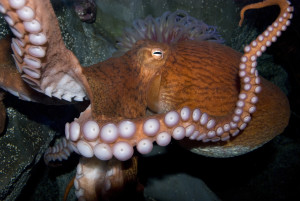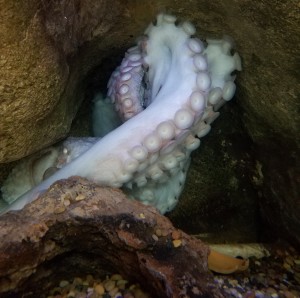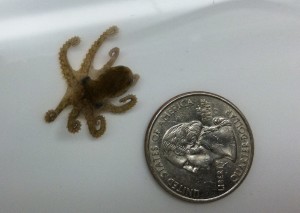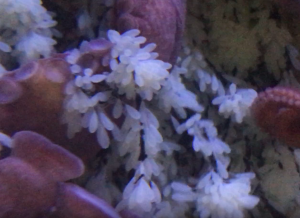There are plenty of arbitrary “holidays” out there, but World Octopus Day is not one of them. It’s October, and it’s the eighth- the sea stars could not be more aligned! So, we’ve put together 8 reasons to celebrate giant Pacific octopus. 
1. A body like no other- As you may have guessed, the giant Pacific octopus is the largest of the octopuses, and can weigh over 50 pounds and extend 15 feet. What looks like the head of the octopus is called a mantle and next to the mantle is the siphon. Water goes into the gills and is expelled through the siphon. The rest of their body is eight arms that work independently and are covered in suckers. Oh yeah, did we mention they have nine brains and three hearts?
2. Wave your arms in the air- Eight arms is a lot to tangle with, but on top of that, giant  Pacific octopuses have over 2,000 suckers! Each sucker works independently to taste, smell, and grasp. And their suction is strong enough to leave hickeys!
Pacific octopuses have over 2,000 suckers! Each sucker works independently to taste, smell, and grasp. And their suction is strong enough to leave hickeys!
3. Kinda chameleon- Octopuses can change their skin color and texture using chromatophores- cells that contain pigment. When the muscles expand and contract, they push color closer to or further from the surface of the skin. Octopus colors can change based on mood, for camouflage, to scare predators, and to communicate with potential mates.
4. Unleash the Kraken- Extremely strong for its size, the giant Pacific octopus can lift rocks and open jars. Their eight arms make them quite the predators to many  ocean creatures, including crustaceans, fish, and other mollusks.
ocean creatures, including crustaceans, fish, and other mollusks.
5. Are you smarter than an octopus- Octopuses are considered some of the most intelligent animals on Earth. They can solve puzzles, navigate a maze, unscrew lids, and discern some shapes. It’s even theorized they can use tools.
6. I’d like to be under the sea- Ever heard of an “octopus’s garden?” Like a beachcomber looking for the perfect shell, octopuses will grab some ocean floor objects like shells or rocks and place them around their den. Females will then lay their eggs and cover the outside of the den to hide it.
7. Short & sweet- The lifespan of a giant Pacific octopus is quite short- about 3-5 years.  The end of their life cycle begins after breeding. The male dies within a few months of mating and the female dies shortly after her eggs hatch. When the female lays her 20,000-100,000 eggs (pictured), she will spend the rest of her life protecting them and will stop eating. It can take months before she passes on and her young fend for themselves.
The end of their life cycle begins after breeding. The male dies within a few months of mating and the female dies shortly after her eggs hatch. When the female lays her 20,000-100,000 eggs (pictured), she will spend the rest of her life protecting them and will stop eating. It can take months before she passes on and her young fend for themselves.
8. Support the ocean- If you’ve enjoyed learning more about octopuses, consider a gift to support our animals, like the giant Pacific octopus, and our mission of connecting people with local wildlife. Could we suggest $8- one per arm?
